Brachytherapy Market Research, 2031
The global brachytherapy market size was valued at $0.83 billion in 2021, and is projected to reach $1.6 billion by 2031, growing at a CAGR of 7.1% from 2022 to 2031. Brachytherapy is a procedure used to treat certain types of cancer and other conditions. It involves placing radioactive material inside the body. This is sometimes called internal radiation. Brachytherapy is an innovative cancer treatment that places radiation directly inside the tumor, or at the surgical margin allowing for a highly targeted treatment dose to be delivered to the target region, while limiting dose to surrounding, critical structures.

Historical Overview
The brachytherapy market size was analyzed qualitatively and quantitatively from 2021 to 2031. The brachytherapy market experienced an increase at a CAGR of around 7.1% from 2021 to 2031. Most of the growth during this period was derived from the North America owing to the rise in the number of key players, rising disposable incomes, as well as well-established presence of domestic companies in the region.
Key Market Dynamics
Growth of the global brachytherapy market size is majorly driven by rise in the prevalence of cancer, increase in the number of geriatric populations, and rise in the prevalence of cancer. Brachytherapy is mainly used for the treatment of the cancer. For instance, according to the data published by World Cancer Research Fund International in 2020, There were an estimated 18.1 million cancer cases around the world.
Furthermore, geriatric population is majorly susceptible to suffer from various cancers diseases such as prostate cancer, breast cancer and lung cancer. For instance, according to the U.S. Census Bureau data published in December 2021, more than 56 million adults ages 65 years of the nation’s population. As per the same source, it is estimated to reach up to 85.7 million by 2050. Moreover, increase in adoption of radiation therapy for the treatment of cancer contributes to the growth of the market.
Thus, rise in prevalence cancer, increases the adoption of radiation therapies and increase in number of hospitals drives the growth of brachytherapy market. Thus, this factor is anticipated to drive the growth of brachytherapy industry.
An increase in prevalence of cancer in developing countries accelerates market growth. The emergence of technologically advanced brachytherapy techniques for treatment of cancer are the opportunities for market growth. Emerging economies of the Asia-Pacific and LAMEA regions present lucrative opportunities for the market players. Surge in cancer cases in the Asia-Pacific region along with rise in brachytherapy procedure awareness is anticipated to positively impact the market growth during the forecast period. Gradual adoption of brachytherapy techniques in hospitals and specialty clinics and rise in funding from government for fighting against cancer in developing regions is expected to provide opportunities for market growth during the forecast period.
Market Segmentation
The brachytherapy market is segmented on the basis of product type, techniques, application, end user, and region. Depending on the product type, the market is classified into seeds, applicators & afterloaders, and electronic brachytherapy. Based on technique, the market is classified into high dose rate (HDR), and low dose rate (LDR). On the basis of application, the market is classified into gynecological cancer, prostate cancer, breast cancer, and others. On the basis of end user, it is fragmented into hospitals, specialty clinics, and others. Region wise, the market is analyzed across North America (the U.S., Canada, and Mexico), Europe (Germany, France, the UK, Italy, Spain, and rest of Europe), Asia-Pacific (China, Australia, India, South Korea, and rest of Asia-Pacific), and LAMEA (Brazil, South Africa, Saudi Arabia, and rest of LAMEA).
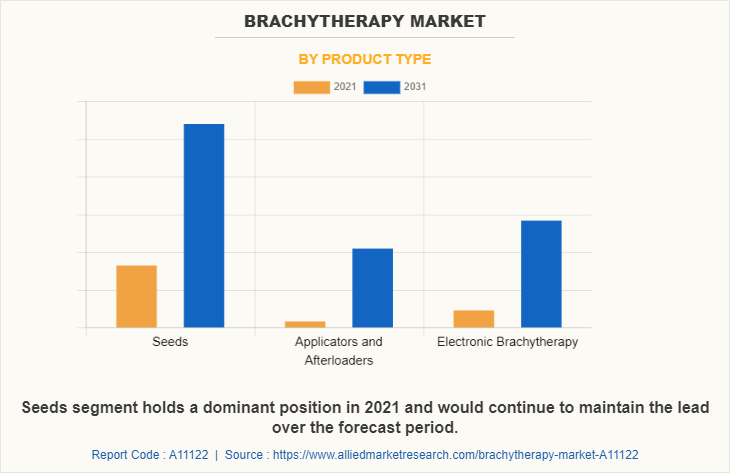
By Product Type
The brachytherapy market is classified into seeds, applicators & afterloaders, and electronic brachytherapy. The seeds segment dominated the market in 2021 and is expected to continue this trend during the forecast period, owing to rise in prevalence of cancer and increase in the number of product launch for seeds implants.
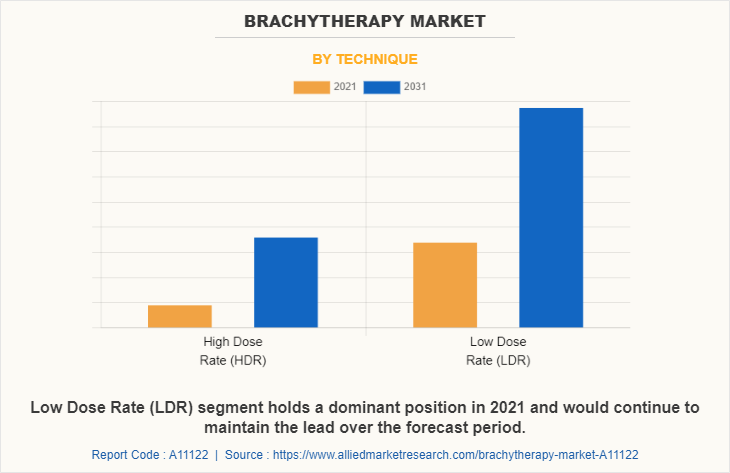
By Technique
The brachytherapy market is classified into high dose rate (HDR), and low dose rate (LDR). The low dose rate (LDR) segment generated maximum revenue in 2021 and is expected to witness highest CAGR during the forecast period, owing to high adoption of low dose rate techniques for the treatment of cancer, increase in prevalence of prostate cancer, breast cancer and gynecological cancer.
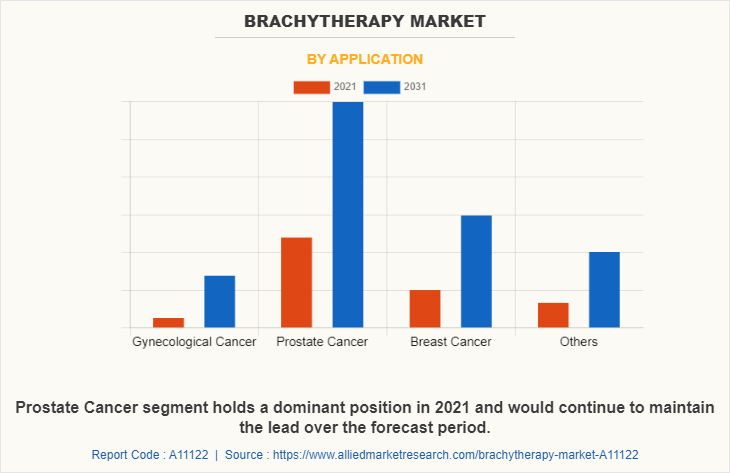
By Application
The market is fragmented into gynecological cancer, prostate cancer, breast cancer, and others. The prostate cancer segment dominated the market share in 2021 and is expected to continue this trend during the Brachytherapy Market Forecast period, owing to rise in prevalence of prostate cancer increase in the number of geriatric populations.
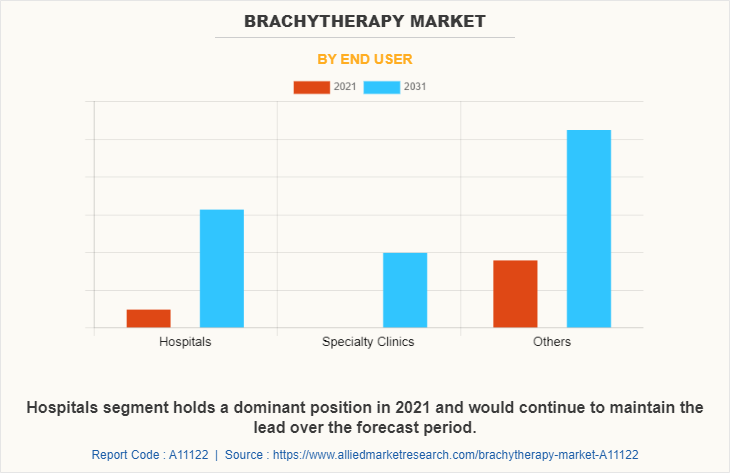
By End User
The market is divided into hospitals, specialty clinics, and others. The hospital segment dominated the brachytherapy market share in 2021 and is expected to continue this trend during the forecast period, owing to an increase in the number of hospitals and rise in the expenditure by governments to develop healthcare infrastructure.
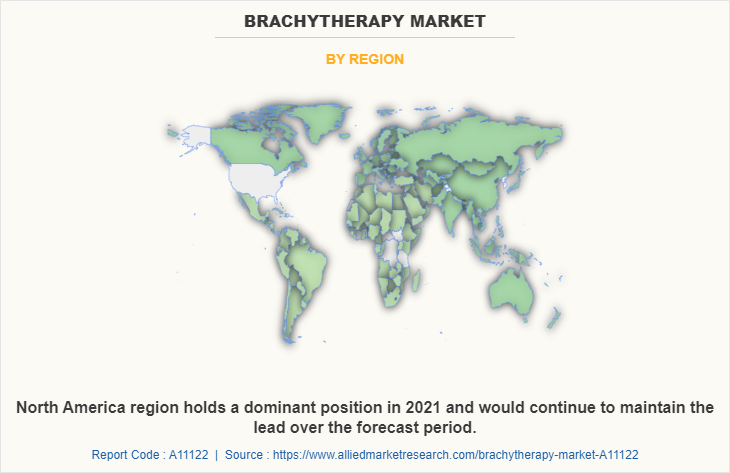
Regional/Country Market Outlook
The brachytherapy market is analyzed across North America, Europe, Asia-Pacific, and LAMEA. North America brachytherapy industry is expected to grow during the forecast period owing to an increase in the prevalence of prostate cancer cancer, breast cancer and gynecological cancer is anticipated to fuel the demand for brachytherapy which drives the growth of market in North America.
In addition, rise in the number of geriatric populations is attributes to drive the growth of brachytherapy market. As geriatric population is more susceptible to cancer, this factor drives the market growth. For instance, according to the U.S. Census Bureau, more than 56 million adults ages 65 and over in U.S. By 2030, it is projected to reach 73.1 million older adults.
Brachytherapy market in Asia-Pacific is expected to grow during the forecast period owing to surge in prevalence of cancer and rising geriatric population drives the brachytherapy market. Moreover, rise in the adoption of radiotherapy is attributed to fuel the demand for brachytherapy and drives the market in the forecast period.
Moreover, the increase in the geriatric population of Asia-Pacific is one of the propelling factors that drive growth of the market. According to the 2020 census, there are approximately 264 million (18.70%) people in China in the application of 60 and over. Moreover, key players in this region focus on expanding their business, which is expected to significantly enhance revenue generation, owing to availability of untapped areas and low cost of services. In addition, rise in the awareness among people regarding advanced cancer treatment and boost the brachytherapy market growth.
Competitive Landscape
Competitive analysis and profiles of the major players in the brachytherapy market include Some of the major companies that operate in the global brachytherapy market include Argon Medical, Carl Zeiss AG, Eckert & Ziegler BEBIG, Elekta AB, Icad, Inc., Isoaid, Isoray Medical, Inc, Merit Medical Systems, Inc, Siemens AG, and Theragenics Corporation. There are some important players in the market such as Siemens AG, Elekta AB and others. Major players have adopted product launch, product expansion and acquisition as key developmental strategies to improve the product portfolio of the market.
Recent Key Strategies and Developments
- In January 2021, Isoray Medical, Inc. received U.S. Food and Drug Administration (FDA) clearance for the use of C4 Imaging’s Sirius positive-signal MRI (Magnetic Resonance Imaging) Markers with Isoray’s Cesium-131, brachytherapy seeds.
- In April 2021, Siemens Healthineers AG, a leading medtech company announced acquisition of Varian Medical Systems, Inc. ("Varian"). This acquisition will accelerates the company's impact on global healthcare and establishes a strong partner for customers and patients along the entire cancer care continuum and for many of the most threatening diseases.
Key Benefits for Stakeholders
- This report provides a quantitative analysis of the market segments, current trends, estimations, and dynamics of the brachytherapy market analysis from 2021 to 2031 to identify the prevailing brachytherapy market opportunity.
- The market research is offered along with information related to key drivers, restraints, and opportunities.
- Porter's five forces analysis highlights the potency of buyers and suppliers to enable stakeholders make profit-oriented business decisions and strengthen their supplier-buyer network.
- In-depth analysis of the brachytherapy market segmentation assists to determine the prevailing market opportunities.
- Major countries in each region are mapped according to their revenue contribution to the global brachytherapy market.
- Market player positioning facilitates benchmarking and provides a clear understanding of the present position of the market players.
- The report includes the analysis of the regional as well as global brachytherapy market trends, key players, market segments, application areas, and market growth strategies.
Brachytherapy Market Report Highlights
| Aspects | Details |
| Market Size By 2031 | USD 1.6 billion |
| Growth Rate | CAGR of 7.1% |
| Forecast period | 2021 - 2031 |
| Report Pages | 218 |
| By Product Type |
|
| By Technique |
|
| By End User |
|
| By Application |
|
| By Region |
|
| Key Market Players | isoray medical, inc., Elekta AB, Siemens AG, Argon Medical Devices, Inc., Eckert & Ziegler BEBIG, Carl Zeiss AG, iCAD, Inc., Theragenics Corporation, Merit Medical Systems, Inc., IsoAid |
| Other Players | Olympus Corporation |
Analyst Review
The brachytherapy market has witnessed growth, owing to an increase in prevalence of cancer across the world and availability of various brachytherapy devices.
According to the perspectives of CXOs, the global brachytherapy market is expected to witness a steady growth in the future. Rise in number of prostate cancers, gynecological cancer and breast cancers cases has led to an increase in number of brachytherapy devices to treat cancer. For instance, according to the American Cancer Institute, in 2021, more than 3.1 million men in the U.S have been diagnosed with prostate cancer. Surge in geriatric population that are susceptible to cancer, increase in unhealthy lifestyle, rise in smoking, and consumption of alcohol that further led to the development of cancer and boost the growth of brachytherapy market. In addition, the increase in preference of healthcare professionals for brachytherapy to treat the cancer and rise in demand of minimal invasive procedure, drives the growth of the brachytherapy market. Brachytherapy procedure is expected to help improve the patient survival rate and reduce the burden of cancer in the world.
North America is expected to witness the highest growth, in terms of revenue, owing to an increase in cases of cancer, robust healthcare infrastructure, presence of key players, and rise in healthcare expenditure. However, Asia-Pacific is anticipated to witness notable growth, owing to increase in awareness related to use of brachytherapy to treat cancer, unmet medical demands, high population base and increase in public–private investments in the healthcare sector.
The total market value of the Brachytherapy Market is $826.04 million in 2021.
The forecast period in the report is from 2022 to 2031.
North America is the largest regional market for Brachytherapy
The market value of the Brachytherapy Market in 2022 was $881.38 million.
Major players profiled in the report are Argon Medical, Carl Zeiss AG, Eckert & Ziegler BEBIG, Elekta AB, Icad, Inc., Isoaid, Isoray Medical, Inc, Merit Medical Systems, Inc, Siemens AG, and Theragenics Corporation
The base year for the report is 2021.
Yes, Laboratory Balances and Scales companies are profiled in the report
The key trends in the Brachytherapy Market are increasing demand for noninvasive cancer treatment, and a surge in technological advancement in radiotherapy.
Loading Table Of Content...



